6 Life Insurance Stories And Real-World Experiences

It’s one thing to read about all the benefits life insurance can bring you.
It’s quite another to see them for yourself—after all, in most cases, if you buy a life insurance policy, the benefits happen after your death.
If you’re the beneficiary, you can easily get lost in the tragedy of a loved one’s loss and the details of their estate. In other words, seeing life insurance’s impact in the real world can be difficult.
To that end, we’ve put together six positive and negative stories about life insurance. These all happened, though the names and some minor details have been changed to protect the identities of those involved.
Since life insurance can serve as a silver lining or unexpected windfall, and there are ways it can go wrong, we’ve tried to fully represent the realities you might experience with various life insurance stories and perspectives.
Compare Top UK Insurers. Find Your Cheapest Life Insurance Quote

#1: The Unexpected Discovery
This one is a tale of miscommunication and an unexpected but welcome windfall. Our protagonist, David, has been living his life to the best of his ability. Nine years ago, his wife tragically passed, and while these things never really leave you, he has essentially come to terms with it.
He’s getting up there in years, trying to enjoy his retirement to the best of his ability, but the combination of the loss of income and pension from her career and a few years of unadvised spending he went through to help cope with the loss have taken their toll.
He’s living on a thin budget, barely making ends meet, and doing what he can to enjoy those heartfelt moments in his golden years.
One day, David received a letter from a life insurance provider in his mailbox. He was informed that, at the time of her passing, his wife had been covered by a life insurance policy to the tune of £150,000. Since David had not been aware of it, he hadn’t known to pursue a claim.
Moreover, since they had moved a few years before her passing, and she hadn’t thought to change her address with the insurance provider, they had lost the means to contact him. That is until a review found him, and they finally contacted him.

David followed up on the letter, and the policy’s payout was deposited with him shortly. This unexpected windfall allowed him to live for several years with much more flexibility and freedom than he had previously, and he could think of it as one more gift she left to him.
The moral of this story is not David’s feel-good experience or the unexpected cash; it’s the fact that life insurance providers aren’t limited by time.
Nine years after her passing, a claim on her life insurance was still as valid as the day she passed away and was still paid out with no issues. Many believe that insurance providers constantly seek loopholes and reasons not to pay, but nothing could be further from the truth.
It is worth noting that this kind of delay is quite unusual. Most insurance providers can keep good track of their customers and begin communications more quickly. This is an important reminder that they don’t stop trying, even after nearly a decade.
#2: Too Much Cover
This story comes from Canada, but truthfully, life insurance is essentially the same no matter where you buy it. Moreover, this tale isn’t about the benefits of life insurance but rather about how important it is to be informed about what you’re buying.
The unnamed individual in question came to social media to ask for advice. His father – who was still relatively young, in his mid-50s – was discovered to have purchased nearly ten different life insurance policies.
The father was coming to his family for assistance because he had reached a point where his finances couldn’t support all of the premium payments. This led to a family discussion and, unfortunately, arguments.
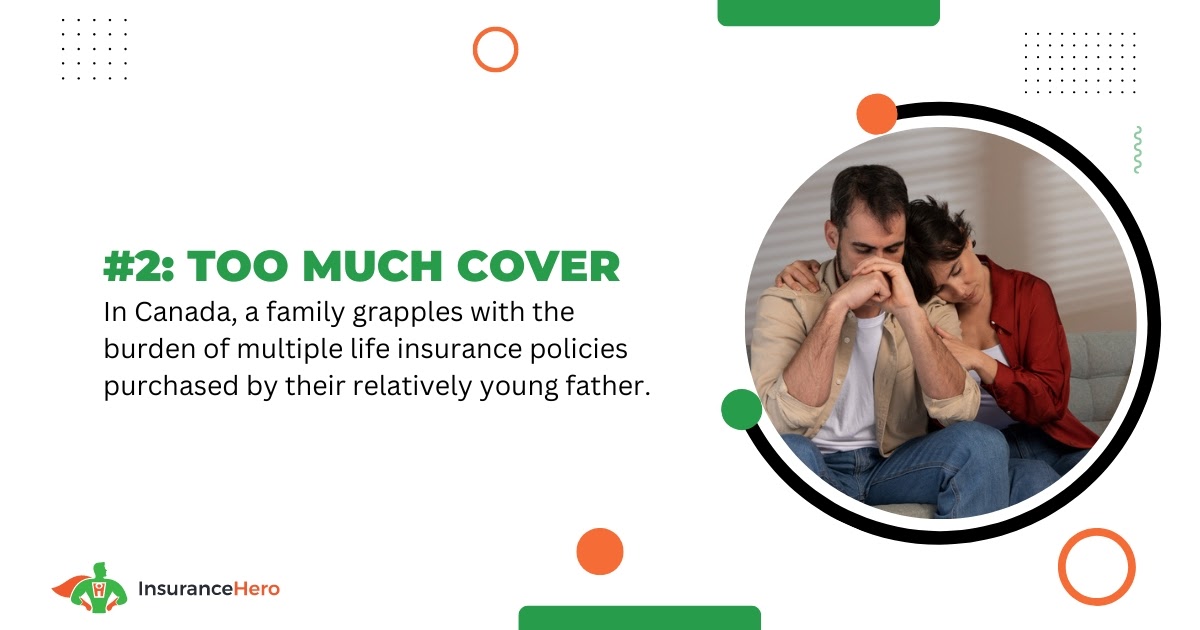
We’re not sure how this story ends, but we can tell you our advice. First, they need to investigate the details of all of these policies.
There are valid reasons to have more than one policy. For example, two policies, each for £25,000, might have a combined premium that is cheaper than one £50,000 policy due to life circumstances. Or, maybe they’re different in some material way, such as one being a term policy and one being a whole life cover plan.
If premiums are unsustainable, some policies should be cancelled. This is when speaking to an insurance professional is a good idea.
Some policies can have retained value or cash value that can be cashed out, while others leave you with nothing when they are cancelled. Getting the most out of a less-than-ideal situation can be tricky, especially with this many policies.
It may be better to adjust a current policy depending on why you want multiple policies.
A typical example is having a second child; a policy that formerly paid out 100% to one child can be adjusted to add the second child as a beneficiary with a 50/50 split, with no need to buy a second policy.
Unfortunately, our protagonist is in a tricky situation, and offering specific advice without knowing more details isn’t easy.
#3: Safeguarding the Future
This story is a much more typical use case for life insurance coverage. Stephen is in a difficult position in a family of four with a single earner.
His job security is incredibly important for his family’s security, and he carefully budgets every pound of his salary to do everything he can to keep his family safe and secure. Even so, he’s not a high earner, so it isn’t easy at times.
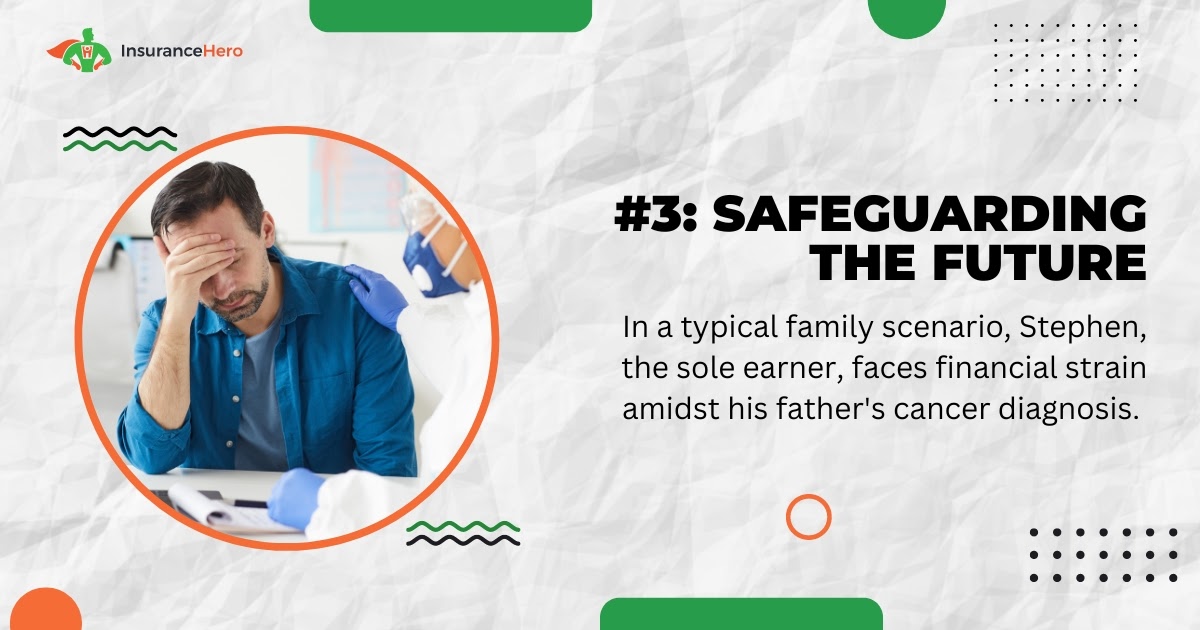
When his father is sadly diagnosed with cancer one year, Stephen’s mortality is suddenly brought to the forefront of his mind.
Cancer has genetic components, which means if someone in your family – especially a parent – falls victim to it, there’s a greater-than-average chance you may as well.
With this in mind, Stephen makes a choice. He gets quotes from top insurance providers in the UK and eventually signs up for a £300,000 policy. This policy protects him and his family against the worst life.
Since Stephen’s father was recently diagnosed, but he is in good health, his premiums are reasonable and only slightly higher due to his father’s illness.
Meanwhile, the amount of cover he receives is more than enough that, if he passes, his wife can pay off their mortgage and have a good chunk left over to keep them going while they get the rest of their affairs in order.
Life insurance can turn a stressful family situation into peace of mind, and while it’s always heart-wrenching to see the family go through something as terrible as cancer, there can be silver linings if you look.
#4: The Value of Early Cover
This next story is something of a cautionary tale. The individual in question, Melissa, was a young and healthy woman in her 30s, making great strides in her career and living her life to the fullest.
She never thought much about life insurance in her thirties, both because she was young and healthy and didn’t have a family to consider.
As she got older, found love, and started a family, she considered life insurance, but she felt healthy and invincible, so she never got around to signing up for it.
Unfortunately, a few years later, she was diagnosed with an autoimmune disease that dramatically cut her quality of life and would, eventually, be the end of it.
Suddenly, the value of caring for her family and leaving something behind for them was much higher in her mind.
The sad reality is that the older you are and the worse your health is, the more expensive it is going to be to get life insurance coverage.
You still can – there’s no such thing as an impossible situation, and there are even guaranteed policies you can get from some providers – but the financial math is a lot more complicated. Premiums are higher for lower amounts of cover.
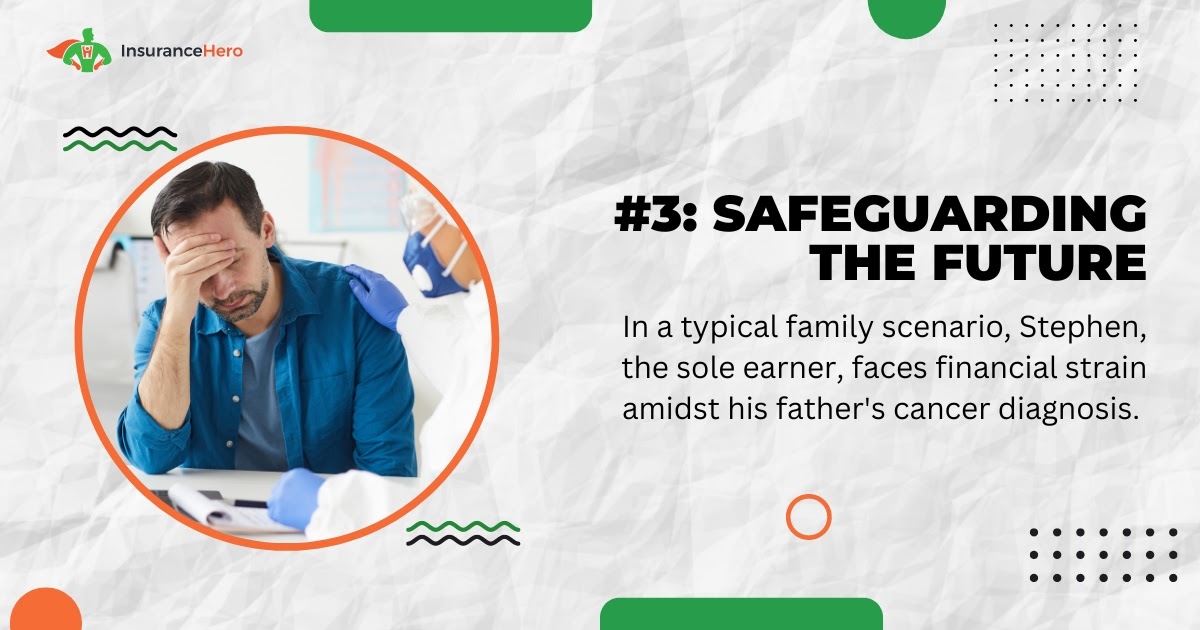
This is a lesson if you’re able to take it to heart. The best time to pick up life insurance coverage is when you’re young and healthy.
You pay into it for a longer amount of time, but the amount you pay is lower, and you can keep a policy rolling for longer in case anything unexpected happens. The longer you wait and the worse your health is, the more ineffective your policy could be.
The second-best time to pick up life insurance cover is now. With some exceptions, you may have slightly higher premiums if you’ve just had a child, for example, but even then, it can still be a good idea.
#5: Proactive Protection
We live in a world where medical science is robust, and many things that, decades ago, would have been a death sentence are now treatable. Unfortunately, that means the things our modern medicine can’t treat are much more devastating.
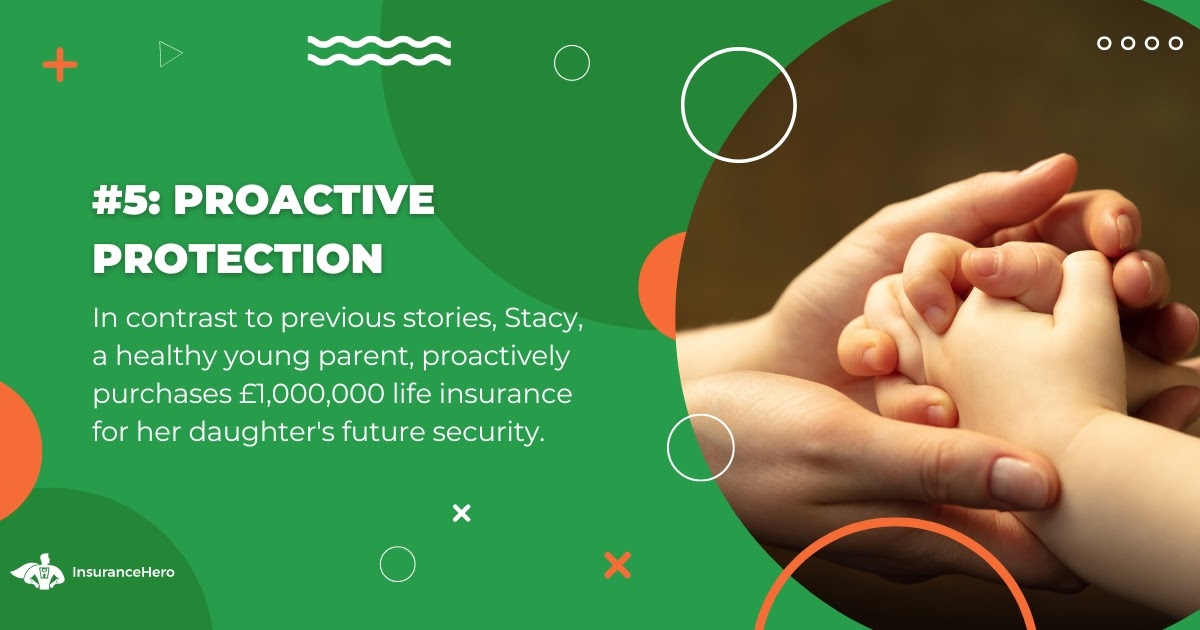
In the inverse of the previous story, our young parent, Stacy, had a beautiful daughter through an unremarkable pregnancy.
With no health issues to speak of and a quick recovery from the birth, she decided to purchase an exceptional £1,000,000 of cover to be paid to her daughter if she passes.
To her, it was a simple decision to use insurance the way it is meant to be used; it was an expense that, if it came to nothing, still meant having lived a long and happy life.
In a tragedy, Stacy was diagnosed with cancer herself a mere two years later. Since she was healthy when she signed up for her policy, her cover didn’t change, and her premiums didn’t rise, but she’s heartbroken nevertheless.
She can’t help but think of all the things she may miss in her daughter’s life. At least, though, she knows that life insurance coverage is there, so if she can’t beat the cancer, she knows her daughter will be well cared for after she passes. It’s comforting in a difficult time.
#6: A Final Present
Perhaps one of the most familiar stories you can have for life insurance is how it triggers in a simple, beneficial way.
Carl had been married for 35 years to his beautiful wife, and they had a long and happy relationship. They both took out life insurance coverage to pay each other, and eventually, the inevitable happened: his wife passed away.
They knew it was coming, and she was loved, cared for, and as comfortable as possible, but it’s still heartbreaking.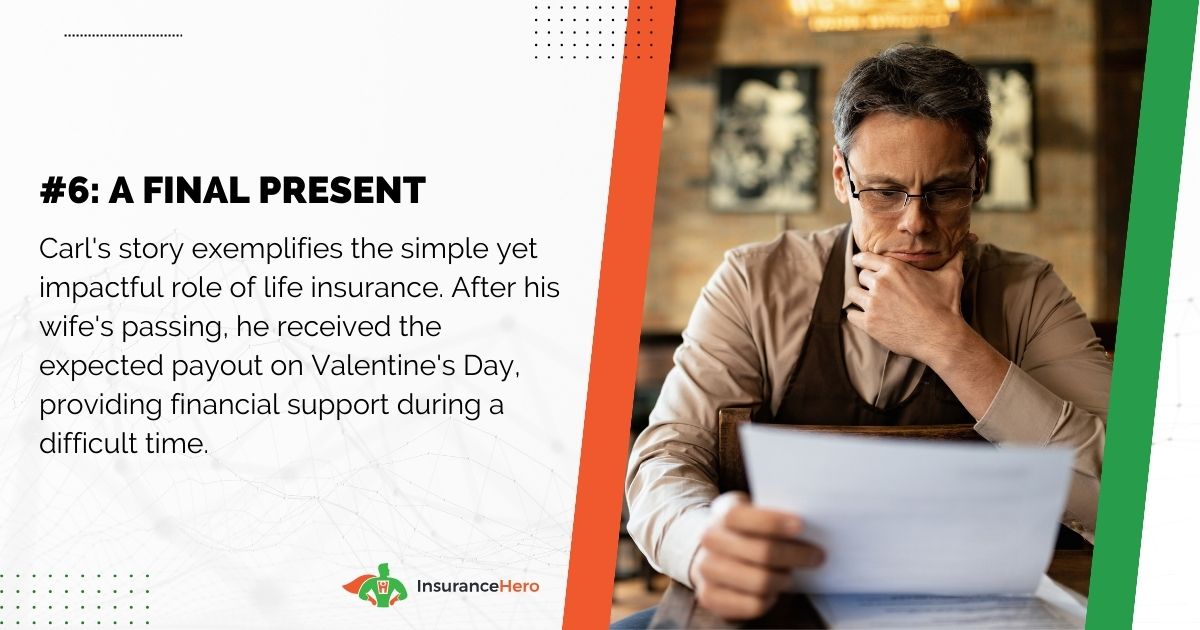
Due to the timing, Carl received the expected payment from his wife’s life insurance cover on Valentine’s Day as one last romantic gesture from his departed beloved.
He was able to use the £230,000 to cover her end-of-life expenses and funeral, with more left over to leave him secure in his lifestyle for years to come.
Death is an inevitable fact of life. Life insurance should be an obvious way to carry on, support those you love and cherish, and promote a happy future.
What about you? Do you have a life insurance story you’d like to tell? We’d love to hear it, whether good or bad, cautionary or exemplary.
The world is big, with many people from all walks of life, and life insurance can benefit everyone.
Telling stories about how it all works and how it can change a life for the better is a great way to help one another, so feel free to contact us.
Of course, we can also help you sign up for life insurance coverage yourself.
Simply click here to fill out a form and start the process by getting quotes from all of the UK’s top insurance providers.
Steve Case is a seasoned professional in the UK financial services and insurance industry, with over twenty years of experience. At Insurance Hero, Steve is known for his ability to simplify complex insurance topics, making them accessible to a broad audience. His focus on clear, practical advice and customer service excellence has established him as a respected leader in the field.


